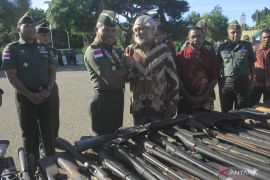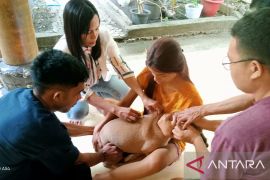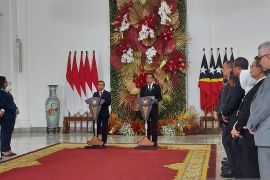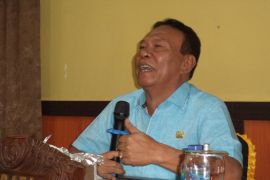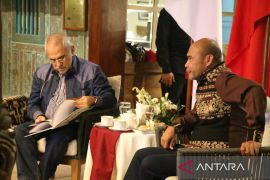Polling began in the morning and ended at 3:00 pm (0600 GMT) with no unrest reported in a contest that pits the Nobel Prize-winning incumbent Jose Ramos-Horta against 11 other hopefuls.
Voting was remarkably organised for a poor and chronically unstable country still traumatised by Indonesia`s brutal 24-year occupation, which ended with a vote for independence in 1999.
"As a matter of security the day was a success. There were no major incidents." said United Nations Police commissioner Luis Carrilho.
"In a few districts the weather conditions were terrible due to heavy rain, so for some people casting their vote was a little bit difficult," he added.
The peaceful polling stood in stark contrast to the deadly pre-election violence that erupted in 2006, which left the country on the brink of civil war.
"There has not been a single incidence of violence, so that`s great for the country," Ramos-Horta said after voting in the capital Dili, with coffee-brown ink on his index finger indicating he had exercised his democratic right.
A large turnout was reported nationwide, with some stations having to dip into reserve ballots, election officials said.
At a school house in the village of Balibar, in the cool hills overlooking Dili, voters trickled in about an hour after polls opened at 7:00 am (2200 GMT Friday), some carrying babies or toddlers and many barefoot.
East Timor`s second presidential election as a free nation is the first in a series of key events for the country as it enters a pivotal period.
In May, East Timor will celebrate 10 years of independence, which came after three years of UN administration. Then, in June, voters will choose a new government in a general election.
At the end of the year the nation of 1.1 million people bids goodbye to UN forces stationed in the country since 1999.
Among East Timor`s many problems is its heavy reliance on energy reserves, which account for around 90 percent of state revenues.
The International Monetary Fund calls it the "most oil-dependent economy in the world".
"It is an obligation for every citizen to vote because this is a democracy and we have the right to choose our own leaders," said Sidonia Perreira, a government clerk who went to vote with his wife and two small children.
Constitutionally, the presidency is largely a ceremonial role, but its profile has been boosted by Ramos-Horta, who shared the 1996 Nobel Peace Prize for his efforts to resolve the independence conflict.
The popular 62-year-old who survived a 2008 assassination attempt is the second post-independence president after Xanana Gusmao -- a former anti-Indonesia rebel leader who is now prime minister.
The race for the presidency is largely a three-way contest between Ramos-Horta, the Fretilin party`s Francisco "Lu Olo" Guterres and former armed forces chief Taur Matan Ruak, a guerrilla leader during the occupation.
Candidates must garner more than 50 percent of the vote for an outright win, otherwise a run-off will be held in coming weeks.
"There will be no second round. I am confident I will win today," Ruak told reporters shortly after voting at a Dili school crowded with voters, journalists, international observers and a stray dog nursing puppies.
In 2007, Ramos-Horta won in a second-round of voting against Guterres, buoyed by the support of Gusmao`s Congress for the Reconstruction of East Timor party.
But this time the party is backing Ruak. Ramos-Horta has been increasingly critical of Gusmao`s government, but he said he was not displeased with the prime minister`s decision to back his rival.
"I`m very happy he`s supporting one of my favourite candidates. If someone supports (Ruak) I`m happy because I admire (Ruak)," he told reporters after voting.
At another polling station in the capital a barefoot last-minute voter rushed in just at the start of a downpour of rain, bending over to wipe off her inked finger in a puddle of muddy water after voting.
Poll workers cancelled unused ballot papers and locked ballot boxes with numbered seals immediately after voting stopped.
Formal results from Saturday`s vote were not expected until early next week.
International observers and representatives from Australia, the European Union and Portuguese-speaking nations monitored the polls. (RN)
Editor: Kunto Wibisono
Copyright © ANTARA 2012

